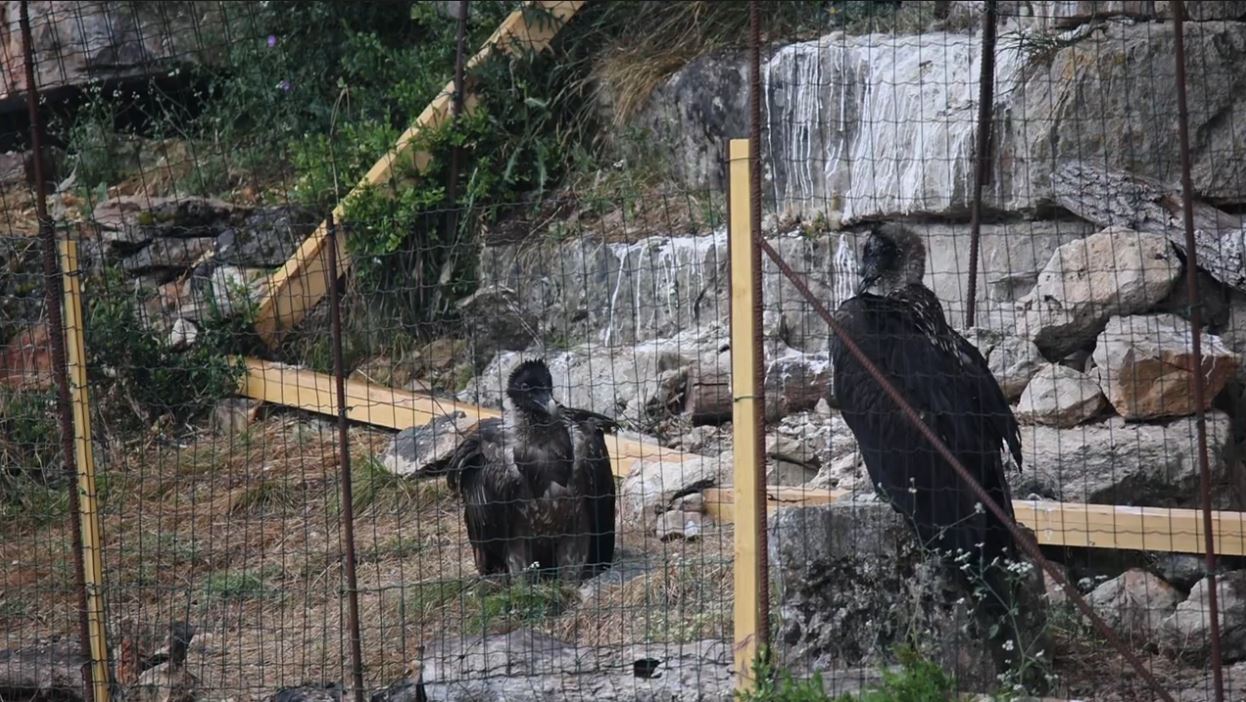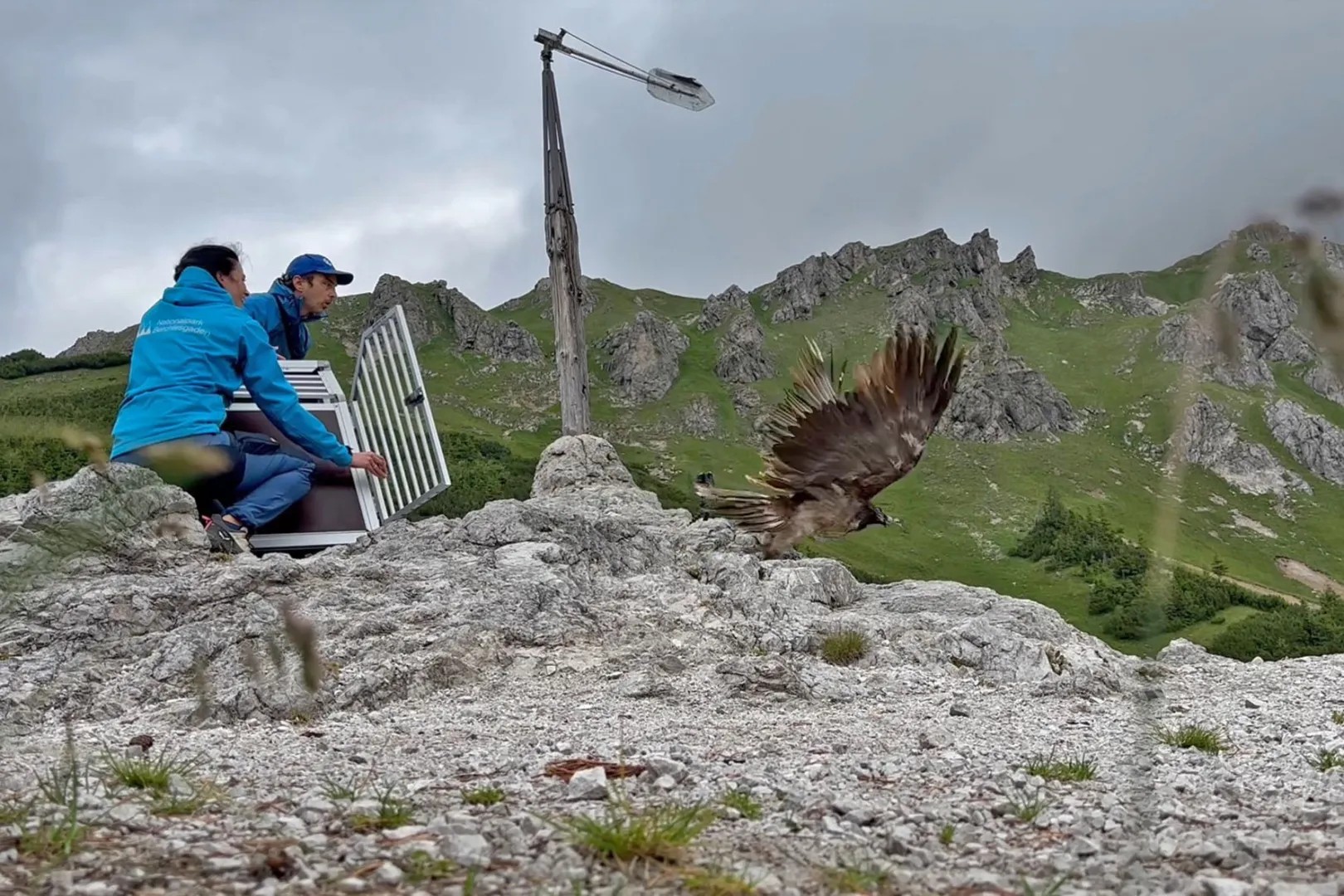
Yet another Bearded Vulture was shot and killed in the Grands Causses where the LIFE GypConnect project reintroduces the species. Dolomie, a young male, is the latest victim of illegal persecution — he was a captive-bred bird that was released in the summer, spending only a few months in the wild before he met his tragic end.
Dolomie’s story
The Bearded Vulture Dolomie was part of the pan-European efforts to bring back this rare species to its former range. Dolomie hatched on 12 March 2020 at the Tierpark Zoo (Berlin), which is part of the Bearded Vulture Captive Breeding Network, coordinated by the VCF on behalf of EAZA’s European Endangered Species Programme (Bearded Vulture EEP). This network breeds the species in captivity across over 40 zoos and breeding centres to support reintroduction and restocking efforts by releasing captive-bred birds into the wild.

The LIFE GypConnect project team released Dolomie on 13 June 2020 in Aveyron in the Grands Causses alongside three other Bearded Vultures as part of the efforts to establish a breeding population of the species in the Massif Central through reintroduction and promoting dispersal movements between the Alps and the Pyrenean populations. Since 2016, the project released a total of 33 Bearded Vultures in the Massif Central and the Pre-Alps. Dolomie managed to spend nearly four months exploring his new home in the wild, but unfortunately, his life was short-lived.
Finding Dolomie’s carcass and cause of death
On 11 October 2020, the project team received an alert by the bird’s GPS tag indicating concerning behaviour, and they immediately launched a field mission. Unfortunately, the team discovered the carcass of Dolomie on the territory of a commune in Lozère, in the Cévennes National Park.

The team quickly retrieved the carcass to perform a necropsy and toxicological analysis. The X-ray showed 15 shot pellets in Dolomie’s body. These pellets did not affect internal organs, but caused the individual to fall, resulting in substernal haemorrhage, haemopericardium, perforation of the intestine and a small bone fracture. Therefore, the bird died as a result of the internal bleeding.
It is incredibly concerning and troubling that direct persecution/illegal shooting still poses a threat to this rare and protected species in the region. LPO (Ligue pour la Protection des Oiseaux) already filed a criminal complaint regarding this atrocity, which is an offence punishable by three years imprisonment and a fine of €150,000. Furthermore, Barbara Pompili, the French Minister of Ecological Transition, has herself deplored the incident and promised that the French State itself would file a case.
The VCF expects an adequate response from the authorities, with a proper investigation and prosecution of the one(s) responsible. The work of the LIFE GypConnect reintroduction project is important and requires a considerable investment, with EU taxpayers money, and can not be jeopardized by the criminal actions of a few.
Illegal persecution remains a threat in the Grands Causses

Unfortunately, Dolomie is not the only Bearded Vulture from the Grands Causses that was shot as at least four more individuals fell victim to illegal persecution. Thankfully, some of these birds survived but that was not the case for Europe. Europe was another young Bearded Vulture released in the Grands Causses in May 2019 that was found dead on 4 October of the same year, and the investigation is still ongoing. Layrou, released in 2013, was the victim of a deliberate shooting in the Lot in June 2014. Sadly, this threat extends to other French regions. Benigno, a 14-year-old individual marked in Spain in 2000, was shot dead on 26 November 2013 in the Pyrénées-Atlantiques.
The responsibility falls now on hunting associations to work towards eradicating this criminal behaviour, and on the police and the judiciary to investigate and prosecute these grave crimes. Experience from elsewhere (Spain) suggests that heavy penalties and prison sentences are a powerful deterrent to mitigate this environmental crime.
As for the VCF, and its partners on the ground, we will continue to work and engage with all sectors of civil society (including hunters) to demonstrate that Bearded Vultures in particular, and vultures in general, are allies rather than a problem, deliver valuable ecosystem services, and are an added value to France’s and Europe’s ecosystems.
LIFE GypConnect

Led by the League pour la Protection des Oiseaux (LPO), the LIFE GYPCONNECT project aims to establish a breeding population of Bearded Vultures in the Massif Central and Department of the Drôme. Releasing captive-bred Bearded Vultures into the wild at sites such as the Parc Naturel Régional des Grands Causses, Parc Naturel Régional des Baronnies Provençales and Parc Naturel Régional du Vercors will create a core population that will connect the two populations of the species in the Alps and Pyrenees. To facilitate movements between the new population and the Alpine and Pyrenean populations the LIFE GYPCONNECT team is creating a network of supplementary feeding stations, and tackling threats such as poisoning, and collision and electrocution with the electricity infrastructure.










